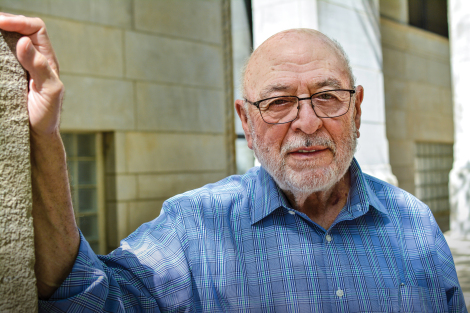“I understand what DePaul calls ‘the mission,’” says Joe (Cacioppo) Cappo (LAS ’57), 1956–57 president of the Student Activity Council (SAC) and a retired communications professional and educator at DePaul’s College of Communication. Like the thousands of students who have exemplified DePaul’s mission, Cappo was the first person in his family to attend and graduate from college.
 “I still, to this day, feel that I was lucky to be able to go to school here,” says Cappo. (Photo by Tom Evans)
“I still, to this day, feel that I was lucky to be able to go to school here,” says Cappo. (Photo by Tom Evans)Cappo and his classmates lived through hard times. Many came of age during the Great Depression of the 1930s and experienced World War II and the Korean War in battle or on the home front. “Those were tough, tough years.”
Cappo ran for SAC president as a way to meet people and make contacts. “There was none of the student government type of thing that they have now,” he says. The major duty of the council was to create a calendar for collegewide activities that would ensure that the groups holding events wouldn’t take attendees away from each other. Nonetheless, Cappo says, “The social aspect of [SAC], I think, was much less important to the students than the socialization aspect of getting to be with other groups from different parts of the city, different ethnic backgrounds. That was the ‘big mix’ era.”
In that mix were reminders of the previous years of trauma. “We had a strong veterans program here. A couple of people I went to school with had injuries from the Korean War,” Cappo recalls. “We didn’t have all the benefits of the [Americans with] Disabilities Act then that have since been passed.”
Student activism wouldn’t really come to DePaul until the 1960s, when “society was up in arms for a lot of different reasons,” says Cappo. “I always looked at my generation, the Silent Generation, as being not very demanding. Minimum pay, health care, women’s services are all very important to students today. They may or may not be more so than when we went to school, but we were not organized in that particular fashion. There was not a way to communicate outside of your own circle. People were just lucky to go to school—at least I was.”
‘Every issue was an 11’
The 1960s represented a crucible moment in U.S. history, as the war in Vietnam and civil rights movements ignited widespread protests, particularly on university campuses. DePaul was no exception, and the SAC moved beyond coordinating social activities. “We were a product of the ’60s,” says Steve Lustig (BUS ’67, JD ’71), 1967–68 SAC president and a financial, tax and transaction law consultant. “We tried to get a larger student voice, [but] the best advocate for it was not the students but Father Cortelyou, who was then president of the university.”
 “It was a long, long time ago on a planet far, far away, but there were an incredibly high percentage of positive experiences that have enhanced my life," says Lustig. (Photo by Tom Evans)
“It was a long, long time ago on a planet far, far away, but there were an incredibly high percentage of positive experiences that have enhanced my life," says Lustig. (Photo by Tom Evans)Lustig considered the Rev. John R. Cortelyou, C.M., (CSH MS ’43) a friend and mentor, appreciating his sense of balance and interest in measured progress. “On a scale of one to 10, we felt every issue was an 11,” Lustig remembers. “He was willing to listen, and if it made sense, work with us. He allowed us to move forward with things [that involved] only students. DePaul offered students a chance to get a terrific education not going page to page, chapter to chapter or book to book, but to get involved in what was going on if they wanted to.”